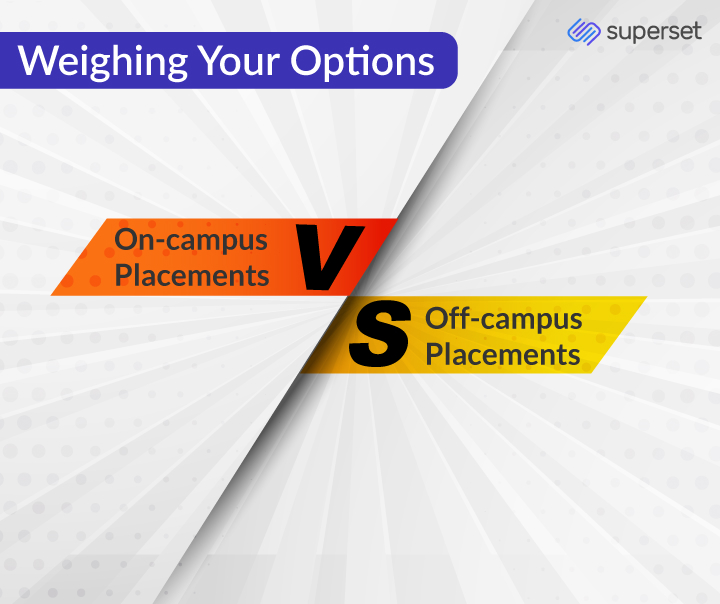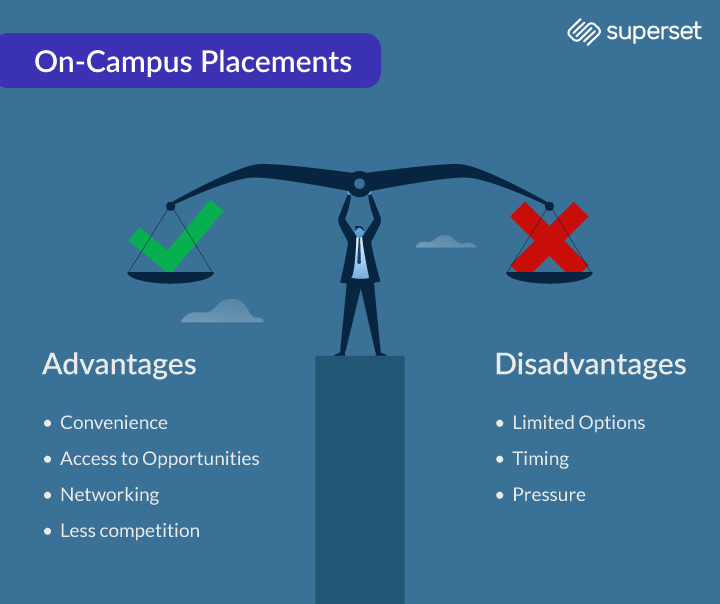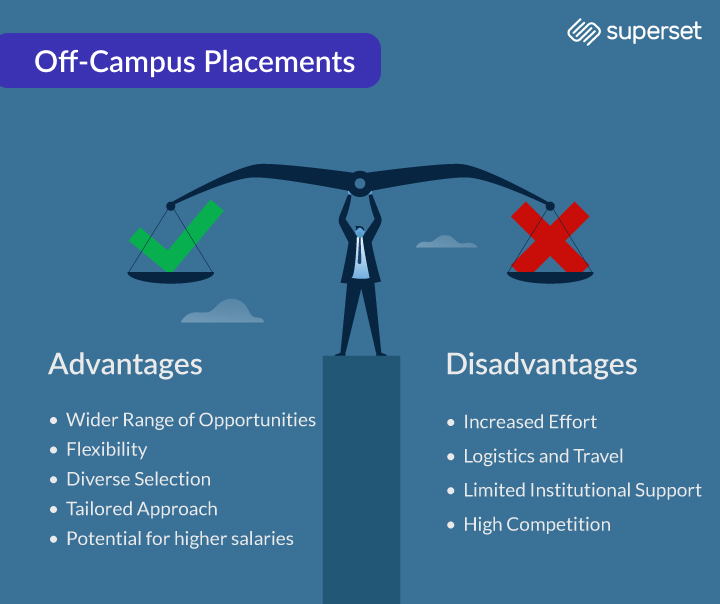
When it comes to the exciting yet nerve-wracking journey of securing employment, students often find themselves standing at a crossroads: on-campus or off-campus placements. As placement season rolls around, these two options become the center of heated discussions and passionate debates.
Picture this: on one side, we have the familiar grounds of on campus placements, where universities transform into bustling hubs of opportunity. On the other side, off-campus placements beckon with the allure of venturing beyond campus boundaries into the vast professional realm.
But fear not, dear students, for we are here to bring clarity to this perennial conundrum. We will shed light on the intricate world of off-campus versus on-campus placements by delving into the differences, weighing the pros and cons, and considering individual preferences.
Get ready to dive into the epic showdown between these two contenders and discover which option reigns supreme.
On-campus Placements Vs Off-Campus Placements
On-Campus Placements
On campus placements refer to the recruitment process conducted within the premises of a college or university. It’s like bringing the job market directly to your doorstep. Various companies and organizations collaborate with educational institutions during on-campus placements to conduct interviews, assessments, and recruitment drives exclusively for their students. These placements typically occur within a designated time frame, often called placement season, where students can showcase their skills and secure job offers without leaving the familiar grounds of their campus.

Advantages:
- Convenience
One of the significant perks of on-campus placements is its sheer convenience. You get to carry out your interviews and online assessments right within the comfort of your educational institution’s familiar surroundings. This means you can bid farewell to the woes of long-distance travel and the complexities of finding your way through unfamiliar locations, ultimately saving you precious time and energy.
By opting for on-campus placements, you can say goodbye to the daily grind of commuting and the headache of arranging transportation to off-site venues. Instead, all you need to do is make your way to the designated placement area on campus, conveniently situated near your dormitory, classrooms, or study spaces.
Additionally, the implementation of automated recruiting software has significantly improved convenience for you during the placement process. With this advanced technology, you no longer have to switch between multiple platforms for interviews, assessments, and receiving job offers. Everything is seamlessly integrated into one campus placement automation software, simplifying the entire process and saving you from the hassle of navigating different tools and platforms.
- Access to Opportunities
Participating in on-campus placements gives you a distinct advantage through your institution’s training and placement cell. These invaluable resources have cultivated relationships with a multitude of companies, creating a gateway to a wide range of job opportunities.
The established connections between your educational institution and various companies can open doors that might otherwise remain closed. The placement cell acts as a bridge, facilitating direct communication and collaboration between students and potential employers. This means you have access to a pool of job openings that have been specifically curated for students within your institution.
- Networking
Networking is a powerful tool in the world of professional growth, and on-campus placements offer a unique opportunity to harness its potential. When you participate in on-campus placements, you unlock the chance to build connections with diverse individuals, including alumni, industry professionals, and potential employers who visit your educational institution.
One of the key advantages of on-campus placements is the direct interaction you can have with alumni who have ventured into the professional world. These alumni, having once walked the same halls and sat in the same classrooms as you possess invaluable insights and experiences to share. They can offer guidance, advice, and even potential career opportunities. Networking with alumni opens doors to mentorship, internships, and possible job referrals, as they have a vested interest in supporting and fostering the success of their alma mater’s students.
In a world where connections can open doors and lead to remarkable career advancements, on-campus placements provide a fertile ground for networking. So seize the chance to engage with alumni, industry professionals, and potential employers who visit your institution. Embrace the power of networking, for it has the potential to shape not only your present job prospects but also your long-term professional journey.
Read here: 8 Benefits of Networking For Students
- Less competition
One of the enticing benefits of on-campus placements is the potential for encountering less competition compared to off-campus alternatives. When participating in on-campus placements, you often have the advantage of a smaller pool of candidates vying for the same job opportunities.
On-campus placements typically attract students from your educational institution, narrowing the competition to your batchmates. This means that the number of applicants competing for each position is often smaller compared to off-campus placements, where candidates from various educational institutions may apply. With a reduced pool of competitors, your chances of standing out and impressing potential employers are significantly enhanced.
While campus placements have their fair share of advantages, it’s important to acknowledge that they also come with certain drawbacks.
Disadvantages:
- Limited Options
One drawback of on-campus placements is the potential limitation it may impose on your choices. The job opportunities available through on-campus placements are typically provided by a select group of companies that have established relationships with your institution. While this can be advantageous in terms of accessibility, it may also mean that you have a narrower range of options to choose from. You may find your choices constrained if you have specific career aspirations or are interested in industries or companies that are not actively participating in on-campus placements.
- Timing
On-campus placements operate on a predetermined schedule set by your institution. While this structure ensures a streamlined process, it may not always align with your preferences or the hiring cycles of certain industries or companies. You might find yourself navigating interviews and assessments at a time that is not optimal for your specific career interests or when your dream company is not actively recruiting. This timing mismatch could limit your ability to explore all the opportunities you desire or make strategic choices based on external factors.
- Pressure
On-campus placements can bring about a considerable amount of pressure. The outcomes of these placements can significantly impact your initial career trajectory, adding to the already existing stress of academic performance. The competition among fellow students can be fierce, and the desire to secure a desirable job offer can create a high-stakes environment.
Off-Campus Placements
An off-campus placement refers to the process of securing a job or internship opportunity outside the confines of your educational institution. Unlike on-campus placements, which occur within the premises of your college or university, off-campus placements involve seeking employment opportunities beyond the campus boundaries.
In an off-campus placement, you are responsible for actively searching and applying for jobs on your own. This may involve researching and identifying companies, browsing job boards or online platforms, attending career fairs or networking events, or reaching out to potential employers directly. The application and selection process typically takes place outside of the organized framework provided by your educational institution.
Off-campus placements offer a wider scope of opportunities, as you are not limited to the companies that specifically visit your campus for recruitment. You have the freedom to explore various industries, companies of different sizes, and geographical locations that align with your career goals and preferences. This flexibility allows you to pursue opportunities that may not be available through on-campus placements.
However, it’s important to note that off-campus placements require a proactive approach and self-directed effort. You may need to invest time and resources into conducting job searches, tailoring your application materials, and preparing for interviews independently.

Advantages:
- Wider Range of Opportunities
Off-campus placements provide access to a wider range of job opportunities compared to on-campus placements. Since you are not limited to companies that specifically visit your institution, you can explore a diverse array of organizations and industries. This opens up new avenues and increases the chances of finding a position that aligns perfectly with your skills, interests, and career aspirations.
- Flexibility
One of the advantages of off-campus placements is the flexibility in terms of timing. Unlike on-campus placements that adhere to a predetermined schedule, off-campus opportunities allow you to apply for placements according to your preferred timeline or industry-specific hiring cycles. This flexibility lets you take control of your job search and tailor it to your needs and circumstances.
- Diverse Selection
With off-campus placements, you have the opportunity to explore different locations, industries, and sectors. Whether you dream of working in a bustling city or a tranquil countryside, in a tech startup or a multinational corporation, off-campus placements allow you to cast a wider net. This diversity exposes you to various work environments, cultures, and professional networks, broadening your horizons and enriching your overall career experience.
- Tailored Approach
Off-campus placements empower you to take a more tailored approach to your job search. You can focus on companies that resonate with your career goals, values, and work preferences. By targeting specific organizations, you can align your skills, experiences, and qualifications with their requirements, increasing your chances of securing a position that truly suits you.
- Potential for higher salaries
Compared to on-campus placements, off-campus opportunities offer higher salary potential. Students participating in off-campus placements can negotiate their compensation packages based on market value, their unique skills, and the demands of the industry. This flexibility in salary negotiations can lead to more competitive offers and better financial rewards.
In a LinkedIn post authored by Richa Singh, she offers a simplified guide/carousel on effectively negotiating your salary. Read here.
Disadvantages:
- Increased Effort
Off-campus placements require a greater investment of effort compared to on-campus placements. You will need to search for job opportunities actively, conduct extensive research on companies, and put in extra effort to prepare tailored applications. The process may involve exploring multiple job portals, attending career fairs, networking events, and reaching out to industry professionals to discover hidden job prospects. Being proactive and dedicated in your job search is important to increase your chances of securing off-campus placements.
If you’re unsure where to begin, we’ve compiled a list of top-notch online off-campus placement portals to help you get started. Take a look here.
- Logistics and Travel
Off-campus placements often involve logistics and travel considerations. You may need to travel to attend companies’ interviews, assessments, or recruitment events. If you secure a job in a different city or region, you may need to relocate, which can add further complexity and costs to the process. Being prepared for potential travel and managing logistical arrangements is essential when pursuing off-campus placements.
- Limited Institutional Support
Unlike on-campus placements that benefit from institutional support services, such as career counseling, mock interviews, or alumni networks, off-campus placements may offer limited access to these resources. You may need to rely more on your personal networks, online resources, and self-guided preparation. It’s important to proactively seek guidance from external sources and leverage online platforms to enhance your job search and preparation efforts.
- High Competition
Off-campus placements often entail a higher level of competition compared to on-campus placements. As you are competing with a larger pool of candidates, including students from various educational institutions, the competition can be intense. It’s important to differentiate yourself by highlighting your unique skills, experiences, and qualities to stand out from the crowd. Be prepared to showcase your strengths and make a compelling case for why you are the ideal candidate for the job.
Conclusion
the debate between off-campus and on-campus placements is not about determining a superior option but finding what works best for you. Both avenues offer unique advantages and challenges, and the ultimate goal of securing a job remains the same.
Whether you prefer the convenience and familiarity of on-campus placements or the wider range of opportunities and flexibility of off-campus placements, the key lies in embracing the path that aligns with your strengths, aspirations, and personal preferences.
Remember, success in the job market is not solely determined by the method of application but by your talent, skills, and dedication. So, while the process of tests, interviews, and group discussions may vary, what truly counts is your ability to demonstrate your capabilities and differentiate yourself from others.
So, keep a positive mindset, stay motivated, and make the most of the resources available to you. And don’t forget to inject a bit of fun into the process! Whether celebrating small victories or finding joy in the journey, maintaining a friendly and lighthearted approach can help alleviate some of the pressure that comes with the placement season.
In the end, it’s not just about whether you go off-campus or on-campus—it’s about the journey you embark on, the lessons you learn, and the growth you experience along the way. So, take a deep breath, trust in your abilities, and enjoy the ride toward a successful and fulfilling career.
Good luck!







